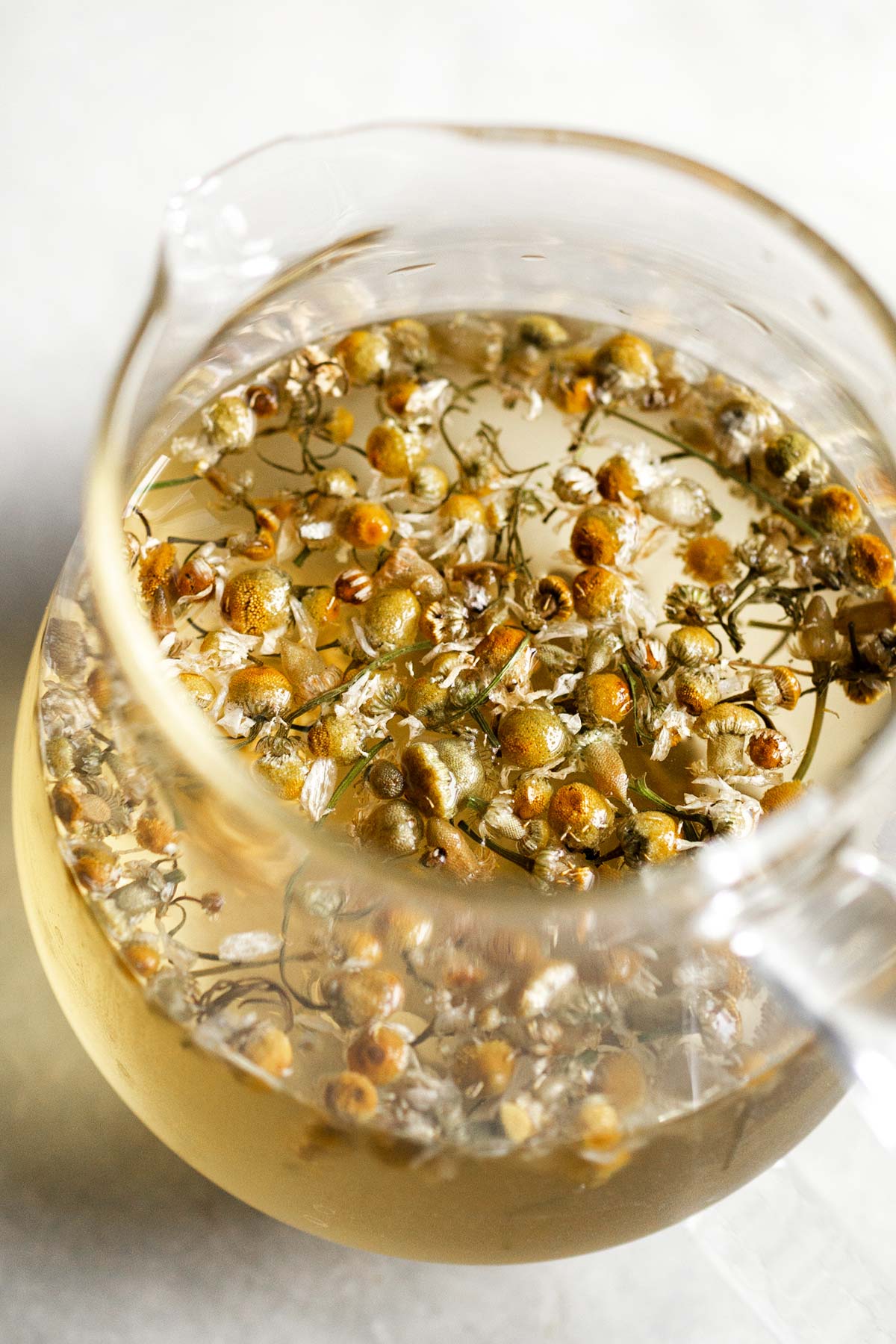What Is Chamomile Tea Good For?
on Nov 20, 2023
This post may contain affiliate links. As an Amazon Associate, I earn from qualifying purchases.
Soothing and delicious, chamomile tea is a popular herbal drink. Chamomile tea contains compounds that promote good health and it can help many parts of the body, including the gut and brain. See its health benefits and why it’s so good for you.

What Is Chamomile Tea?
A caffeine-free herbal drink, chamomile tea is made by steeping dried chamomile flowers in water. It can be made hot or iced.
Chamomile flowers are small, white flowers with yellow centers. They’re part of the daisy family.
There are many types of chamomile and the ones used for tea are German chamomile and Roman chamomile.
Photo Credit: Harney.com
RELATED: How to Brew Chamomile Tea Properly
15 Chamomile Tea Health Benefits
1. Promotes Relaxation
Chamomile tea is known for its calming effect on the body. This is due to a compound called apigenin.
Apigenin affects certain molecules in the brain. The result is a sedative, or relaxing, effect.
Compounds in chamomile also increase relaxation by acting on neurotransmitters, or chemicals that send signals between nerve cells.
If you’re feeling tense or anxious, try drinking chamomile tea. Its calming effects can help you feel less stressed.
2. Improves Sleep
As chamomile tea relaxes the body, it also enhances sleep. That’s why chamomile tea is a popular bedtime drink.
The tea has been shown to benefit sleep quality. This is important for feeling rested and refreshed the next day.
Chamomile might also shorten sleep latency, or the time it takes to fall asleep. A shorter sleep latency means you’ll fall asleep faster.
Plus, chamomile tea has no caffeine. You can drink it before bedtime without disrupting your sleep.
3. Reduces Oxidative Stress
Oxidative stress happens when cells become damaged. If it goes on for too long, it can lead to chronic conditions like cancer, diabetes, and heart disease.
Drinking chamomile tea can lower oxidative stress. It’s rich in antioxidants, or compounds that protect cells from damage and oxidative stress.
Examples of antioxidants in chamomile include luteolin and apigenin. They’re natural plant compounds that protect cells from damage.
Additionally, chamomile may increase glutathione, an important antioxidant in the body.
4. Lowers Inflammation
Inflammation helps the body repair itself. It happens when cells or tissues are damaged.
But too much inflammation, like oxidative stress, can contribute to chronic disease. So it’s important to control it.
One way is to drink chamomile tea. The antioxidants in chamomile have anti-inflammatory properties.
Compounds in chamomile also work by decreasing inflammatory cytokines, or proteins that trigger inflammation.
5. Relieves Digestive Issues
Chamomile tea is a natural remedy for an upset stomach. It relaxes the intestinal muscles, potentially easing issues like gas and diarrhea.
The drink is also helpful for symptoms of motion sickness, like nausea and vomiting.
Plus, many intestinal disorders are rooted in inflammation. Since chamomile tea has anti-inflammatory effects, it can benefit digestive conditions too.
This includes diverticular disease, acid reflux, and inflammatory bowel diseases, like ulcerative colitis.
6. Controls Blood Sugar
Another chamomile health benefit involves blood sugar, or blood glucose. This is important because high blood sugar can contribute to diabetes.
According to studies, chamomile increases how much glucose is stored in the liver. In turn, it reduces blood sugar levels.
The antioxidant effects of chamomile are beneficial too. Oxidative stress can increase blood sugar, harming beta cells in the pancreas.
Beta cells make a hormone called insulin, which controls blood sugar levels. So having healthy beta cells is key for reducing the risk of diabetes.
7. Decreases Cancer Risk
Chamomile tea could lower the chances of cancer. It’s all thanks to its antioxidant and anti-inflammatory properties.
Apigenin, one of the main compounds in chamomile, is responsible for this benefit. It works by finding and destroying free radicals.
Free radicals are harmful molecules that damage healthy cells. If there are too many free radicals, it causes oxidative stress and contributes to cancer.
Additionally, apigenin stops the growth and spread of cancer cells. It also has anti-tumor activity, meaning it works against tumors.
8. Soothes Sore Throat
As chamomile tea reduces inflammation, it will aid swelling from a sore throat.
Also, it has antimicrobial properties, so it kills or slows the spread of bacteria or viruses. This can be useful when you’re fighting a cold.
You’ll also sleep better after drinking chamomile tea, which is important when you’re not feeling well.
Chamomile tea pairs well with honey, another ingredient that’s good for soothing a sore throat.
9. Helps Premenstrual Syndrome
Many people who menstruate experience premenstrual syndrome, or PMS, right before their period. Chamomile tea can offer relief during this time.
First, the herbal drink may ease pain caused by period cramps. It’s due to the anti-spasmodic effects of the tea.
PMS can also cause anxiety and feelings of depression. However, the calming effect of chamomile tea could help manage these mental symptoms.
Chamomile tea regulates the neurotransmitters serotonin and dopamine. These neurotransmitters, or chemical signals, are responsible for mood.
10. Improves Blood Pressure
Without treatment, high blood pressure can lead to heart disease. It’s also known as hypertension.
Some animal studies have found that chamomile has anti-hypertensive properties. It may work by reducing chemicals that contribute to hypertension.
What’s more, chamomile has anti-inflammatory and antioxidant effects. Inflammation and oxidative stress can both contribute to hypertension, so controlling it could lower the risk.
The apigenin in chamomile has also been shown to act on chemical reactions involved in hypertension.
11. Regulates Blood Cholesterol
When your cholesterol levels are too high, it’s known as high blood cholesterol. It happens when excess cholesterol builds up in your blood vessels.
This decreases blood flow, which can increase the risk of chest pain, stroke, and heart attack.
According to studies, chamomile can lower high blood cholesterol in people with diabetes. This is key because diabetes and high blood cholesterol usually happen together.
It might also reduce LDL cholesterol, or “bad” cholesterol, and increase HDL cholesterol, or “good” cholesterol.
12. Increases Hydration
Your body uses water for many basic functions, including metabolism, digestion, breathing, and reguatling your temperature.
But water isn’t your only choice for staying hydrated. Drinking chamomile tea is a great alternative.
Since the drink is caffeine-free, you can drink it any time of the day. It won’t disrupt your sleep.
Chamomile tea even has electrolytes, or minerals that support hydration. This includes potassium, magnesium, and calcium.
13. Protects the Brain
Chamomile has neuroprotective properties, meaning it protects nerve cells, or neurons. This can support overall brain health.
It works by reducing the death of nerve cells, which is key for good brain function over time.
The antioxidants in chamomile are beneficial as well. Oxidative stress and inflammation can harm nerve cells, leading to problem with brain health and memory.
However, antioxidants naturally decrease oxidative stress and inflammation. This lowers the risk of disease in the entire body, including the brain.
14. Controls Allergies
If you have an allergy condition like asthma or eczema, adding chamomile tea to your treatment plan might help.
Chamomile has been shown to act on mast cells, which are part of the immune system. They’re involved in inflammatory reactions, including allergies.
Specifically, reduces the release of histamine of histamine from mast cells. Histamines are compounds that cause allergic reactions.
It’s worth noting that chamomile tea isn’t a replacement for allergy medication. But it might help manage allergies by controlling histamine.
15. Aids Bone Health
According to some research, chamomile might reduce the risk of osteoporosis and benefit bone health.
Osteoporosis is caused by low bone mass, which results in weak bones that are more likely to break. The risk is higher with age.
The apigenin in chamomile might help. It’s thought to work by increasing the growth and activity of osteoblasts.
Osteoblasts are cells that make new bones. They also aid bone healing, making them important for overall bone health.
Side Effects
Although chamomile can relieve allergies in some people, it can cause allergic reactions in others. The risk is higher if you’re also allergic to ragweed pollen.
Chamomile tea can also increase the risk of bleeding when taken with blood-thinning medications.
In some cases, the tea can cause nausea or dizziness. If you experience these symptoms, avoid drinking the tea.
Questions You May Have
For most people, it’s safe to drink chamomile tea every day. It’s high in antioxidants and has no caffeine.
Avoid chamomile tea if you’re taking blood-thinning medications. You might also need to avoid it if you’re allergic to ragweed pollen. If you’re pregnant, ask your doctor if it’s safe to drink the tea.
Chamomile tea can reduce oxidative stress and inflammation. It also has a calming effect on the body, making it helpful for stress, anxiety, menstrual cramps, and digestive issues.












